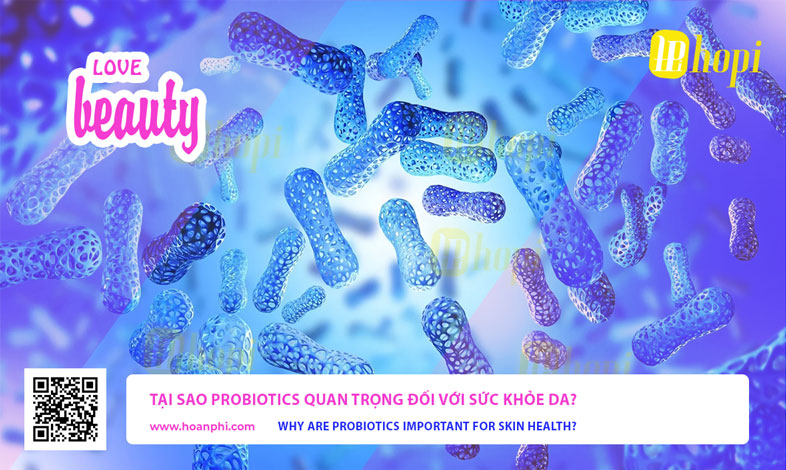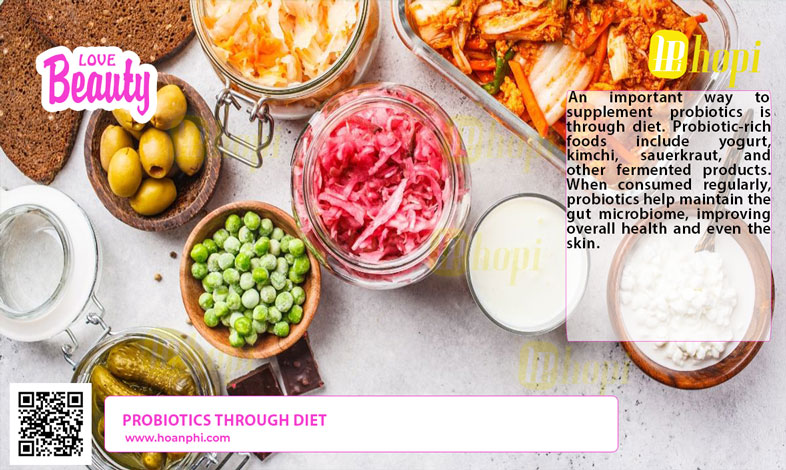Probiotics, also known as beneficial bacteria, have become a key element in health and skincare in recent years. Research shows that probiotics not only benefit the digestive system but also bring positive effects to skin health. In this article, we will explore why probiotics are important for skin health, how they work, and how to incorporate probiotics into your daily skincare routine. Additionally, there will be a combination of probiotics and spa equipment in skincare to deliver the best results.
Read more:

Why Are Probiotics Important for Skin Health?
1. What are probiotics?
Probiotics are beneficial bacteria that live in the body, helping to maintain a balance of microorganisms. They primarily exist in the gut and play an important role in supporting digestion, boosting the immune system, and maintaining overall health. However, recently, we have also recognized that in addition to protecting digestive health, probiotics can also help protect and improve the skin.
Probiotics can balance the skin’s microbiome, reduce inflammation, and strengthen the skin’s natural protective barrier, helping the skin become healthier and smoother.
2. The relationship between the microbiome and skin health
a. What is the skin microbiome?
The skin microbiome is a collection of billions of bacteria, viruses, fungi, and other microorganisms living on the skin’s surface. They play a vital role in maintaining balance and protecting the skin from harmful agents such as acne-causing bacteria, allergens, and environmental impacts.
When the skin’s microbiome becomes imbalanced, the skin can become prone to irritation, inflammation, and issues like acne, eczema, and other inflammatory skin conditions.
b. Probiotics help balance the skin microbiome
Probiotics act as a guardian for the skin’s microbiome. By providing the skin with enough beneficial bacteria, probiotics help balance the microbiome, inhibit the growth of harmful bacteria, reduce inflammation, and protect the skin from environmental damage.
Using probiotics regularly in your skincare routine can improve dry skin, oily skin, and even acne problems.
3. The effects of probiotics on skin health
a. Reducing skin inflammation and irritation
One of the biggest benefits of probiotics is their ability to reduce skin inflammation. These beneficial bacteria help decrease inflammation, soothe the skin, and minimize irritation.
This is particularly important for people with sensitive skin or those prone to dermatitis. Using probiotic-infused skincare products can help the skin become smoother and less irritated.
b. Treating acne
Acne often results from an imbalance in the skin’s microbiome and the overgrowth of acne-causing bacteria. Probiotics can help restore this balance by inhibiting the growth of acne-causing bacteria and reducing inflammation.
Numerous studies have shown that using probiotics both orally and topically can help reduce acne and improve the overall health of acne-prone skin.
c. Strengthening the skin’s protective barrier
The skin’s natural protective barrier acts as a shield, protecting the skin from harmful environmental factors, including bacteria, dirt, and chemicals. When this barrier is weakened, the skin becomes more sensitive and prone to damage.
Probiotics help strengthen the skin’s protective barrier by maintaining a balanced microbiome, thereby protecting the skin from harmful agents and keeping it healthy.
d. Improving skin hydration and elasticity
Probiotics also help improve skin hydration, making it softer and more supple. This is particularly important for those with dry or dehydrated skin. By maintaining a healthy microbiome, probiotics help the skin retain its natural moisture and improve elasticity.
4. Probiotics and skincare from the inside
a. Probiotics through diet
An important way to supplement probiotics is through diet. Probiotic-rich foods include yogurt, kimchi, sauerkraut, and other fermented products. When consumed regularly, probiotics help maintain the gut microbiome, improving overall health and even the skin.

Probiotics through diet
b. Probiotic supplements
If you cannot get enough probiotics from food, you can use probiotic supplements. Many probiotic capsules have been researched and proven to benefit skin and overall health.
5. Probiotics and external skincare
a. Probiotic skincare products
Nowadays, many probiotic skincare products have appeared on the market. These products can include cleansers, moisturizers, serums, and masks. They help supplement beneficial bacteria directly onto the skin, supporting microbiome balance and protecting the skin from harmful agents.
b. Probiotics and spa equipment
Combining probiotic skincare products with spa equipment is an excellent way to optimize your skincare routine. Modern spa devices such as steamers, facial massagers, or LED light machines can help enhance the effects of probiotics on the skin.
- Facial steamer: Opens pores and helps probiotic products penetrate deeper into the skin.
- Facial massager: Improves blood circulation, helping probiotics spread evenly and work better on the skin’s surface.
- LED light machine: LED light can stimulate collagen production and support the action of probiotics on the skin, keeping it healthy and elastic.
6. How to incorporate probiotics into your skincare routine
a. Morning skincare routine with probiotics
- Cleanser: Use a probiotic cleanser to gently clean the skin while providing beneficial bacteria.
- Probiotic serum: After cleansing, apply a probiotic serum to strengthen the skin’s protective barrier.
- Probiotic moisturizer: Finish the morning routine with a probiotic moisturizer to hydrate and protect the skin all day.
b. Evening skincare routine with probiotics
- Facial steaming with a spa steamer: Open pores and deeply clean the skin using a facial steamer. Afterward, apply probiotic products to maximize their effects.
- Facial massager: Gently massage to stimulate circulation and help probiotic products absorb into the skin.
- Probiotic mask: Use a probiotic mask 2-3 times a week to hydrate and nourish the skin.
c. Incorporating probiotics through diet
Supplement your daily diet with probiotics by eating yogurt, drinking kefir, or using probiotic supplements to care for your skin from the inside.
7. Long-term benefits of using probiotics for skin
a. Healthier, less irritated skin
Regularly using probiotics helps the skin become healthier, minimizing irritation and inflammation.
b. Smoother, firmer skin
With the ability to balance the microbiome and enhance hydration, the skin becomes smoother and firmer, offering a youthful and radiant appearance.
c. Reducing acne and preventing aging
Probiotics can help reduce acne and prevent the appearance of wrinkles and other signs of aging thanks to their anti-inflammatory properties and protection against environmental damage.
Probiotics play an essential role in maintaining skin health and protecting it from issues like inflammation, irritation, and acne. By combining probiotics with modern spa devices, you can achieve optimal skincare results. Start today with a balanced diet, probiotic skincare products, and the right spa equipment to enjoy healthy, youthful skin.











